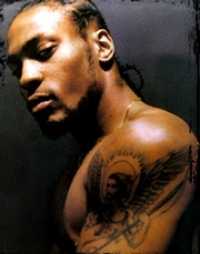BORN: February 11, 1974
WHEN D'Angelo appeared on the scene in 1995, something was clearly afoot in the world of R&B. Challenged for dominance by hip-hop — a battle it was rapidly losing — R&B needed something fresh and needed it now.
There are no committees overseeing all of this, of course. If change occurs in music, it happens organically or not at all. How incredible, then, that not just one artist, but a whole host of them, arrived at about the same time to usher the music into a new millennium. Erykah Badu, Maxwell, Tony Rich, and Lauryn Hill (then making her mark with the Fugees) all came on the scene intent on moving forward, but only in a way that was mindful of R&B's rich history and respectful of the artists who had preceded them.
Also among this group of newcomers was Michael Arthur, known to the world at large as D'Angelo. Born in 1975 in Richmond, Va., D'Angelo was the son and grandson of preachers and began playing piano at the age of 5. He nurtured his musical talent and soon enough, it became clear that his preference was the stage, not the pulpit. In 1991, a record executive snagged a demo of his hip-hop group, I.D.U., and signed the fledgling artist to a publishing deal. By the time he was 18, D'Angelo had also gained notoriety by winning the Amateur Night at the Apollo contest for three weeks running.
D'Angelo's first major move was writing and co-producing "U Will Know," the lead single from the movie soundtrack to Jason's Lyric. At the same time, he was working on his debut album, Brown Sugar, which would find him filling every significant role in the studio — composer, arranger, producer, performer. D'Angelo was, in effect, a one-man band, just as artists such as Stevie Wonder and Prince had been before him.
That's some pretty prestigious company right there, and Brown Sugar drew comparisons to those artists and more. Much of his music was old-school, drawing on the examples of Wonder, Marvin Gaye, Curtis Mayfield, Smokey Robinson, and others (one of the tracks on the album was a smooth reworking of Robinson's "Cruisin'"). But D'Angelo could be as profane as his rap contemporaries, as the song "S--t, Damn, Mother F--ker," made clear.
As remarkable as the album is, and as much notoriety as D'Angelo received for his varied contributions, he was in absolutely no hurry to follow it up. He wasn't content to follow the traditional route often demanded by those who hold the purse strings in the music business: milk an act for all it's worth and then quietly let it fade away. (His contemporaries weren't so lucky: Badu followed her spectacular debut with a quickie live album that went nowhere and Rich was unable to match his winning single "Nobody Knows.")
For his part, D'Angelo more or less dropped out of sight. He didn't completely disappear, however, finding time during the hiatus to record a duet with Hill on "Nothing Even Matters," from The Miseducation of Lauryn Hill. D'Angelo also kept himself busy with soundtrack work, collaborating with DJ Premier on the album accompanying the film Belly. His cover of Prince's "She's Always in My Hair" graced the Scream 2 album, while "Heaven Must Be Like This" turned up on the Down in the Delta soundtrack. Finally, he teamed with Method Man for "Break Ups 2 Make Ups" on the latter's Tical 2000: Judgement Day.
If there is any doubt about how much respect the young artist was accorded by his elders, consider that he was also tapped to work with B.B. King (the duet "Ain't Nobody Home") for the blues master's Deuces Wild album, and with David Sanborn and Eric Clapton (sitting in on Cream's "Sunshine of Your Love" during Sanborn's 1998 New Year's Eve TV special).
Still, reports of D'Angelo's sophomore album would come and go. Part of the delay was certainly due to record-company wrangling. EMI, his label for Brown Sugar, went out of business, and he switched to Virgin. But he was also taking his own sweet time, experimenting with taking his sound to the next level. Unlike Brown Sugar, which D'Angelo recorded by himself, Voodoo, the follow-up, was made with a lot of help from his friends. Among the musicians on the album are guitarist Charlie Hunter, trumpet player Roy Hargrove, bassists Pino Pallidino and Raphael Saadiq, and drummer Ahmir "?uestlove" Thompson. Method Man, Redman, and Lauryn Hill also lend their support on the disc.
For all its years in production, Voodoo is a loose and groove-oriented album. It hearkens back to the past, with hints of influences such as Al Green, Sly Stone, the Ohio Players, and other funky forefathers. As ever, D'Angelo is a man who isn't trapped by the past, but one who doesn't mind standing on the shoulders of those who've gone before him. After all, the view of the future is much clearer from up there.
